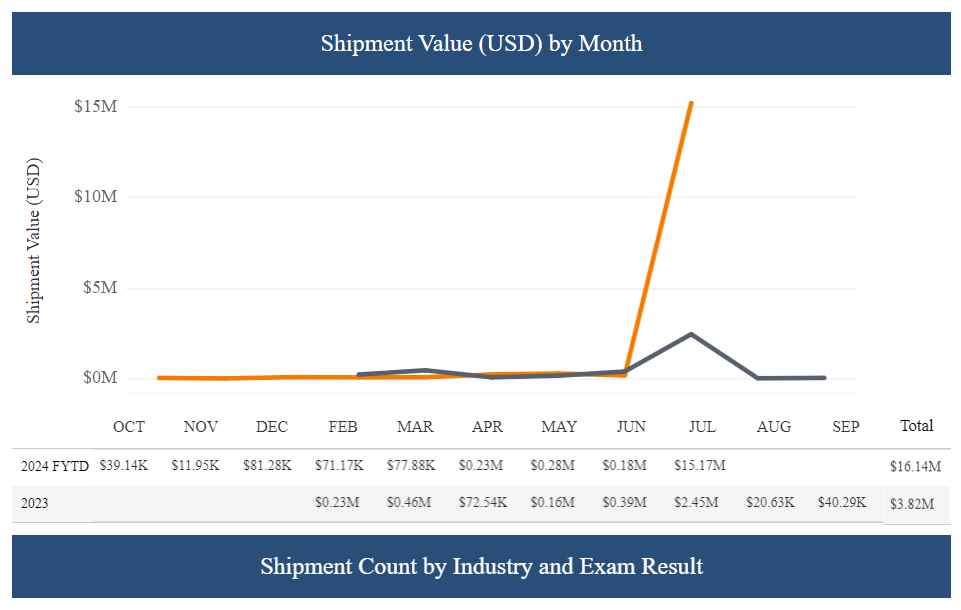
Trade Compliance Flash: UFLPA Entity List Additions Focus on Critical Minerals
International Alert
On August 8, 2024, the Forced Labor Enforcement Task Force (FLETF) announced the addition of five new companies to the Uyghur Forced Labor Prevention Act (UFLPA) Entity List. Four newly listed entities are in the critical minerals industry, while the other manufactures structural components and materials for construction. The chart below lists the five entities and the U.S. government's reason for the listing. Parties on the Entity List are subject to the UFLPA's rebuttable presumption that products they produce are made using forced labor and are therefore prohibited from entry into the U.S. under 19 U.S.C. 1307.
Tracing the provenance of minerals can be extremely difficult, especially when the product under review is a consumer product. In those cases, the U.S. importer and its direct supplier usually have no commercial relationship with the mineral supplier who is several tiers removed in the product's supply chain. Consider an electric vehicle (EV) battery. If detained, the importer – who may be a battery company or an automaker – could be required to trace the lithium, nickel, cobalt, manganese, graphite, and any other minerals used in the production. Perhaps that is expected by now, given the forced labor-related attention given to the battery industry for years. But what if U.S. Customs and Border Protection (CBP) detains kitchen appliances or any other product not yet under the spotlight, and asks the importer to trace the aluminum used to make a component? CBP is already making such requests, and when they do, importers are often caught flat-footed, unable (at least in the short term) to get that information.
Another take. The additions demonstrate an alignment between the industries the FLETF is targeting and industries that have traditionally been known to pose high risk of causing or contributing to human rights impacts. Specifically, legislative developments focusing on conflict and critical minerals and related guidance on due diligence from the Organisation for Economic Cooperation and Development (OECD) and the Responsible Mining Initiative (RMI) reflect that the mining industry has for years been seen as posing human rights risks. Companies that are working to leverage their already existing human rights due diligence frameworks to address UFLPA risks may find increasing opportunities to streamline their efforts in doing so, as UFLPA enforcement trends continue to align with broader, widely recognized human rights risks.
More listings are sure to come. More than half of the entities on the UFLPA Entity List were added in 2024. Crucially, not all are based in the XUAR. A growing group of listed entities are located elsewhere (some even outside of mainland China) and are accused of sourcing materials from the XUAR or working with the government of the XUAR for purposes of "poverty alleviation," "pairing-assistance," or other "government labor scheme that uses forced labor."
In other news, automotive detentions have increased. In July, CBP detained a meaningful amount of shipments assigned to the Automotive & Aerospace Center (86 shipments valued at over $15 million). We suspect that most are automotive parts. Notably, most of the detained shipments are of Malaysian origin. CBP detained very few automotive shipments in FY 2024.

Source: https://www.cbp.gov/newsroom/stats/trade/uyghur-forced-labor-prevention-act-statistics
Miller & Chevalier has deep experience in both proactive UFLPA compliance strategies to mitigate the risk of detentions and interfacing with CBP to secure the release of detained goods. Our team is led by a former CBP attorney and includes attorneys with extensive knowledge of U.S. anti-forced labor laws and priority sectors, and Mandarin language skills.
Contact us for further details on how Miller & Chevalier's Customs & Import Trade and Business & Human Rights practices are helping companies develop strategic approaches to anti-forced labor compliance.
Richard A. Mojica, rmojica@milchev.com, 202-626-1571
Daniel A. Solomon, dsolomon@milchev.com, 202-626-5982
Aditi Patil, apatil@milchev.com, 202-626-1485
Mary H. Mikhaeel*
*Former Miller & Chevalier attorney
The information contained in this communication is not intended as legal advice or as an opinion on specific facts. This information is not intended to create, and receipt of it does not constitute, a lawyer-client relationship. For more information, please contact one of the senders or your existing Miller & Chevalier lawyer contact. The invitation to contact the firm and its lawyers is not to be construed as a solicitation for legal work. Any new lawyer-client relationship will be confirmed in writing.
This, and related communications, are protected by copyright laws and treaties. You may make a single copy for personal use. You may make copies for others, but not for commercial purposes. If you give a copy to anyone else, it must be in its original, unmodified form, and must include all attributions of authorship, copyright notices, and republication notices. Except as described above, it is unlawful to copy, republish, redistribute, and/or alter this presentation without prior written consent of the copyright holder.